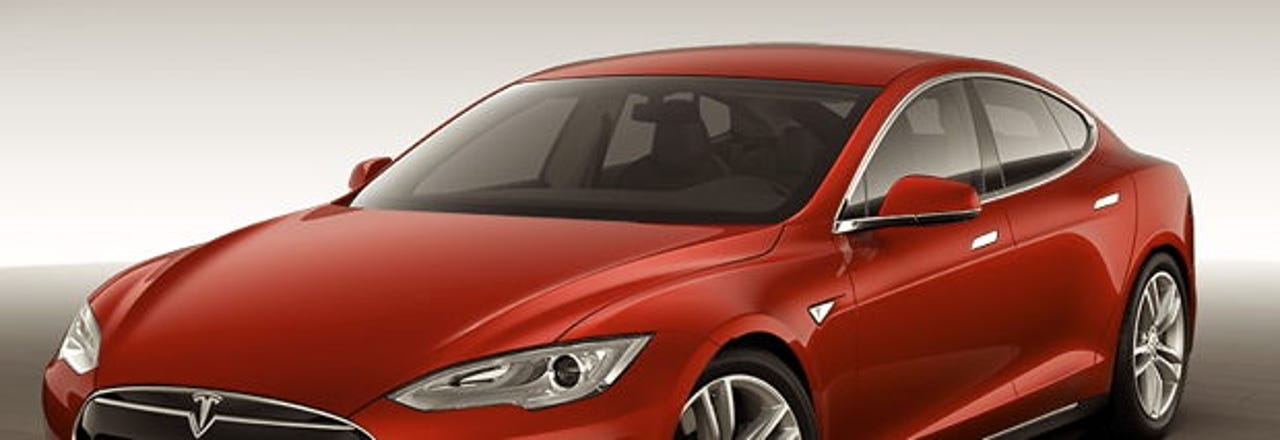More speculation on rumored Apple, Tesla deal

Everyone (and I mean everyone) appears to have advice for Apple CEO Tim Cook. How and where Apple should innovate next, what company to buy and where to put its hoarded $160B pile of cash. In his latest post to the Monday Note blog, Jean-Louis Gassée talks about past suggestions, Cupertino's major technology deals, and mostly, the recent rumors of an Apple deal for Tesla Motors. It's terrific reading.

Apple CEO Tim Cook last year said that 2014 would be the year for iOS integration in cars, so it also makes sense that Apple and Tesla could be talking about the in-car entertainment and a Siri voice interface. Of course, Tesla produces a small number of cars today, but that is expected to grow (the company said it hopes to manufacture as many as 500K units in the future). Tesla's cars fit well into Apple's quality, up-market brand.
Instead, Gassée points out that the two companies are some of the world's largest battery customers in the world (backed up with graphs and analysis of Apple's recent manufacturing output).
Instead of producing a proprietary battery from scratch for the Model S electronic car, as did the rest of the automotive industry, Tesla bundled mass-market, small lithium-ion batteries used for consumer applications (I just bought a couple of 18650s for my super-bright tactical flashlights). The company is now OEMing its battery packs and its production constraint is battery production. Tesla CEO Elon Musk is planning a major manufacturing effort for battery cells.
According to Tesla, the plant’s capacity in 2020 will be higher than what the entire world produced in 2013. A more likely explanation for Apple’s conversation with Tesla might be something Apple does all the time: Sit with a potential supplier and discuss payment in advance as a way to secure supply of a critical component.
Of course, neither Tesla nor Apple will comment. Why should they? But a partnership born of their comparable needs for battery volumes makes a lot more sense than for the two companies to become one.
Like Gassée, I find it difficult to understand the reasonings of those who suggest that Apple would purchase Tesla outright. It wouldn't fit the pattern.
Apple has purchased companies for specific technologies and it appears patents. At a February shareholders meeting, Tim Cook said that Apple had made some 23 acquisitions over the past year and a half. These have all been in the technology category.
Apple's hardware and software solutions deal with the creation and consumption of A/V content. Have we seen the company buy into Hollywood production units or content companies? No. So, why believe that Apple would want to buy a car company?
Featured
However, I am leery of saying "absolutely not" based on Apple's past practices and strategies.
In 2010, Apple released the first generation of iPad. A few years earlier, I sadly admit that I dismissed the rumors of an Apple ultralight platform, based on past "digital hub" strategies. (Really, my doubts were for a Mac-based, cheap ultrabook, which turned out to be correct).
At the Macworld Expo in January 2001, Steve Jobs introduced the concept of the "digital lifestyle," where the Mac would be a "digital hub" that delivers and receives content to and from a variety of content peripherals. The strategy here was (and continues to be) about content creation. Apple provides a great content platform for professional and consumer content creators as well as the best software editing tools.
But how well would an ultralight or tablet computer fit into this content-creation hub strategy? The tablet is way outside the model. (It's hard to figure out where tablet computing is really headed. Analysts point to medical applications but my doctor has desktop in her office and uses a small desktop on a cart in the examination room.)
Still, the ultralight might fit into the strategy. However, the goal of an ultralight is hyper-mobility, which would likely mean a compromise on the performance needed for content creation. Customers would have to weigh the ultralight's weight and cost and see if there's still a value when it comes to creating content.
So, the floorspace of Apple Stores keeps growing, and certainly, many of them have the space for a car inside. With Apple, anything could happen.